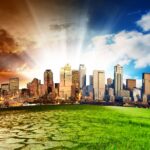Advancing Procedural Equity in Climate Adaptation- Part 1
Climate change is an international phenomenon but its effects, including its impacts on human health, are local – often depending on geography, weather patterns, and a community’s resources and degree of resilience, including the historic and current-day consequences of racism.
Climate change is an international phenomenon but its effects, including its impacts on human health, are local – often depending on geography, weather patterns, and a community’s resources and degree of resilience, including the historic and current-day consequences of racism.
August 24 2021
As more and more Americans are experiencing the impacts of climate change, communities and governments are looking with greater urgency for ways to mitigate them and adapt.
This case studies series, a follow-on to the December 2020 TFAH/Johns Hopkins Bloomberg School of Public Health report, Climate Change & Health: Assessing State Preparedness, examines efforts by states and localities to conceptualize and implement climate change adaptation programs that are centered on equity.
Evidence shows that many communities most effected by climate change and its related health impacts are in that position due to environmental, social, and demographic factors. Part 1 of this series helps identify adaptation strategies that are designed to advance procedural equity in climate adaptation – that is, the process undertaken to conceptualize, design, and administer adaptive programs that are informed by the insights, priorities and needs of people who have lived experience in the threaten community. Such community members should have a seat at the planning table and a role in all decision-making processes.
Climate adaptation programs in California, Louisiana, Philadelphia, Boston, and Albuquerque are discussed.

